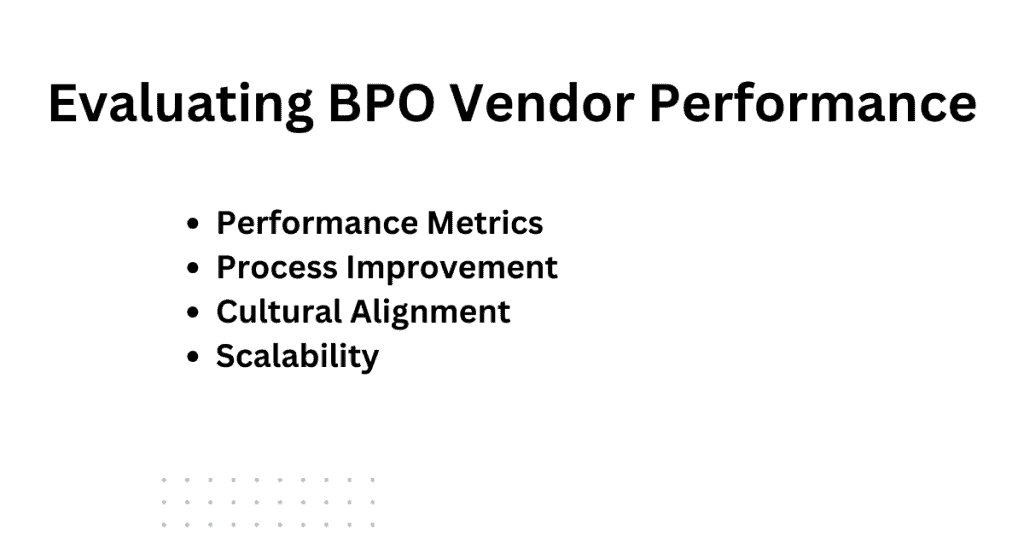In the competitive landscape of modern business, leveraging Business Process Outsourcing (BPO) has become a strategic imperative for companies seeking to enhance efficiency and focus on core competencies. At the heart of establishing a fruitful BPO partnership lies the critical phase of BPO vendor trial periods. This stage is instrumental in evaluating the vendor’s capability to meet your business’s unique needs through a comprehensive assessment encompassing performance metrics, service level agreements (SLA), and risk assessment.
BPO vendor trial periods serve as a pivotal juncture to assess outsourcing effectiveness, ensuring alignment with your business objectives in terms of process improvement, cost efficiency, and scalability. A well-structured trial period facilitates rigorous vendor selection, focusing on key evaluation criteria like cultural alignment and communication protocols. By integrating best practices for BPO trial periods, businesses can maximize value, steering clear of common pitfalls through a meticulous outsourcing assessment.
Employing a data-driven approach during the trial, including SLA monitoring and performance evaluation, empowers businesses to make informed decisions based on tangible success metrics. This period is also an opportune time for stakeholder feedback, which plays a crucial role in negotiation strategies and contract terms refinement. Ensuring vendor accountability and compliance checks during the trial lays the groundwork for a transparent and effective partnership.
Understanding BPO Vendor Trial Periods
Understanding BPO vendor trial periods is crucial for businesses considering outsourcing key operations. A BPO vendor trial period is a predetermined timeframe during which a company can evaluate the services of a BPO vendor under real-world conditions without committing to a long-term contract. This phase is essential for assessing the compatibility, efficiency, and effectiveness of the outsourcing partnership.
The primary purpose behind implementing trial periods with BPO vendors is to mitigate risk and ensure that the vendor can meet the company’s specific needs and expectations. It allows for a hands-on evaluation of the BPO’s ability to deliver on service level agreements (SLAs), adhere to performance metrics, and align with the company’s culture and communication standards.
Key components of BPO vendor trial periods typically include clearly defined objectives, performance criteria, and a timeline. The typical duration of trial periods can vary but usually spans from a few weeks to several months, depending on the complexity and scope of the outsourced services.
During the trial, it’s vital to focus on several areas for a comprehensive evaluation:
- Performance Evaluation: Assessing how well the BPO meets established performance metrics and SLAs.
- Risk Management: Identifying and managing potential risks associated with outsourcing specific processes.
- Service Quality: Evaluating the quality of the services provided and their impact on customer satisfaction and business operations.
- Communication Protocols: Ensuring effective and efficient communication channels between the company and the BPO vendor.
- Cultural Fit: Understanding how well the BPO’s organizational culture aligns with that of the company.
- Cost Efficiency: Analyzing the cost-benefit ratio of the outsourced services to determine financial viability.
Employing best practices for BPO trial periods can significantly enhance the value derived from these evaluations. This includes setting clear expectations, maintaining open lines of communication, and using a structured approach to gather and analyze feedback from all relevant stakeholders.
To effectively evaluate BPO vendor trial periods, companies should employ key metrics for BPO trial assessment, focusing on service delivery quality, adherence to SLAs, cost savings, and improvement in operational efficiency. Avoiding pitfalls in BPO vendor trials involves thorough due diligence, clear contractual terms, and proactive management of the trial period.
Benefits of BPO Vendor Trial Periods
BPO vendor trial periods offer a strategic advantage in risk mitigation for businesses by allowing an assessment of vendor capabilities before a full commitment. This trial phase serves as a critical evaluation period, where businesses can gauge the compatibility between the vendor’s processes and their own operational needs. The flexibility and cost-effectiveness provided by these trial periods enable companies to make more informed outsourcing decisions, ultimately leading to a more streamlined and efficient partnership.
One of the key benefits of BPO vendor trial periods is the opportunity for thorough performance evaluation. During this phase, businesses can closely monitor performance metrics and service quality, ensuring they align with the established Service Level Agreements (SLA). This not only aids in risk assessment but also in contract negotiation, as companies gain leverage by having concrete data on vendor performance.
The trial period also allows for an in-depth process improvement analysis. Companies can identify any potential bottlenecks or inefficiencies within the vendor’s processes and assess their ability to implement necessary changes. This is crucial for long-term scalability and cost efficiency, as it ensures that the vendor can adapt to the evolving needs of the business.
Moreover, BPO vendor trial periods provide a unique opportunity to assess cultural alignment and communication protocols. The trial serves as a pilot project, where stakeholder satisfaction can be gauged through feedback loops and stakeholder feedback. This is vital for maintaining a harmonious working relationship and ensuring that both parties are on the same page regarding expectations and objectives.
In terms of cost-benefit analysis, the trial period offers invaluable insights. Businesses can evaluate the cost efficiency of outsourcing to the vendor against the quality of services provided. This helps in making a more informed decision regarding the scalability and financial viability of the partnership.
Furthermore, the trial period facilitates effective transition planning. By assessing the vendor’s compliance checks, process optimization capabilities, and scalability assessment, businesses can ensure a smooth transition of processes, minimizing disruptions to operations.
Setting Up a BPO Vendor Trial Period
Setting up a BPO vendor trial period is a crucial step in ensuring that the outsourcing partner aligns with your business needs and objectives. The trial period serves as a testing ground to assess the vendor’s capability to meet your requirements, manage risks effectively, and adapt to your business culture. This phase helps in making informed decisions about long-term partnerships.
Steps to Initiate a BPO Vendor Trial Period
- Define Clear Objectives: Begin by outlining the goals you aim to achieve with the BPO vendor trial periods. These objectives should be specific, measurable, achievable, relevant, and time-bound (SMART).
- Set Expectations: Clearly communicate your expectations regarding the scope of work, deliverables, timelines, and quality standards. This ensures both parties are on the same page from the start.
- Determine KPIs: Establish key performance indicators to monitor and evaluate the vendor’s performance throughout the trial period. Common KPIs include turnaround time, accuracy, cost savings, and customer satisfaction rates.
- Draft an SLA: The Service Level Agreement should detail the terms of the trial, including responsibilities, performance benchmarks, reporting mechanisms, and escalation procedures.
- Risk Assessment: Conduct a thorough risk assessment to identify potential challenges and develop mitigation strategies. This step is critical for a smooth trial period and long-term partnership.

Evaluating BPO Vendor Performance
To maximize value from BPO vendor trials, it’s imperative to have a robust evaluation framework in place. This involves:
- Performance Metrics: Utilize the established KPIs to assess the vendor’s effectiveness in meeting the trial objectives. Performance metrics should cover quality, efficiency, cost-effectiveness, and stakeholder satisfaction.
- Process Improvement: Monitor the vendor’s ability to identify and implement process improvements for enhanced efficiency and quality.
- Cultural Alignment: Evaluate the vendor’s cultural fit with your organization, focusing on communication styles, work ethics, and values.
- Scalability: Assess the vendor’s capacity to scale operations up or down based on your business needs.
Best Practices for BPO Trial Periods
- Communication: Maintain open and transparent communication channels with the vendor. Regular meetings and updates can help address issues promptly.
- Stakeholder Feedback: Gather feedback from key stakeholders within your organization to gauge the trial’s impact on different departments.
- Negotiation Strategies: Be prepared to negotiate contract terms based on trial outcomes. This might include adjustments to service levels, pricing, or scope.
- Trial Extension: Consider extending the trial period if more time is needed to evaluate the vendor’s performance comprehensively.
Transitioning from Trial Period to Long-Term Engagement
Transitioning from a trial period to a long-term engagement with a BPO vendor is a critical step that can determine the success of your outsourcing endeavors. This phase requires careful consideration of various factors to ensure that the partnership is fruitful, sustainable, and aligned with your business objectives. Here are key considerations and tips for moving from a BPO vendor trial period to full-scale engagement, ensuring a solid foundation for long-term success.
Key Considerations for Transitioning from BPO Vendor Trial Periods
- Evaluation of Trial Effectiveness: Assess the trial period’s success by reviewing performance metrics against the set benchmarks. This involves a thorough analysis of service quality, compliance checks, and stakeholder feedback to ensure the vendor meets or exceeds expectations.
- Risk Assessment: Conduct a comprehensive risk management evaluation to identify potential challenges in scaling the services. Consider factors such as vendor accountability, cultural alignment, and communication protocols to mitigate risks effectively.
- Stakeholder Satisfaction: Gauge the satisfaction levels of key stakeholders within your organization. Their feedback is invaluable in understanding the impact of the BPO services on various business functions and overall company morale.
- Process Improvement and Optimization: Analyze the trial period for opportunities to optimize processes for better efficiency and cost savings. This could involve process optimization strategies and regular performance evaluation sessions with the vendor.
Tips for Negotiating Terms and Solidifying the Partnership
- Service Level Agreements (SLA) Negotiation: SLA monitoring during the trial period provides insights into service quality and vendor reliability. Use this data to negotiate SLAs that align with your business goals, ensuring clear definitions of service standards and accountability measures.
- Cost-Benefit Analysis: Perform a cost-benefit analysis to understand the financial impact of transitioning to a full-scale engagement. This analysis should include a review of cost efficiency during the trial period and projected savings or ROI from scaling the engagement.
- Scalability Assessment: Ensure that the BPO vendor can scale their services to meet your growing needs. Discuss scalability assessment findings and future growth projections to align the vendor’s capabilities with your expansion plans.
- Cultural and Communication Alignment: Cultural fit and effective communication protocols are crucial for long-term partnership success. Ensure that the vendor’s corporate culture complements yours and that there are efficient feedback loops and communication channels in place.
- Contract Negotiation and Transition Planning: Use insights from the trial period to negotiate a contract that includes flexibility for process improvements, scalability options, and termination clauses. Transition planning should also be a key focus to ensure a smooth shift from trial to full-scale operations.
Conclusion
BPO vendor trial periods are pivotal in ensuring the success of outsourcing initiatives. They allow businesses to evaluate vendor capabilities, performance metrics, and alignment with service level agreements (SLA) before fully committing. This strategic approach to vendor selection through trial effectiveness and outsourcing assessment minimizes risks and sets the foundation for a fruitful partnership.
Effective BPO trial strategies involve a thorough evaluation of vendor performance against predetermined criteria, including process improvement, cost efficiency, and scalability. Key metrics for BPO trial assessment, such as stakeholder satisfaction and cultural alignment, are critical. Moreover, communication protocols during these trial periods ensure transparency and facilitate smooth transition planning.
Best practices for BPO trial periods recommend integrating performance evaluation, risk management, and contract negotiation aspects to ensure service quality meets business needs. This includes SLA monitoring, compliance checks, and negotiation strategies to safeguard business interests and ensure vendor accountability.
Maximizing value from BPO vendor trials involves a comprehensive cost-benefit analysis and scalability assessment to ensure the chosen vendor can adapt to changing business needs. Feedback loops and stakeholder feedback are invaluable for continuous process optimization and achieving long-term success.
FAQs
What is a BPO vendor trial period?
A BPO vendor trial period is a preliminary phase before finalizing a long-term contract with a Business Process Outsourcing (BPO) provider. During this time, the client company tests the vendor’s services to assess their capabilities, performance, and compatibility with the client’s requirements.
How long should a BPO trial period last?
A BPO trial period typically lasts between 1 to 3 months. This duration allows enough time to evaluate the vendor’s performance across various metrics and under different circumstances without committing to a long-term contract prematurely.
What criteria should be used to evaluate a BPO vendor during the trial?
Criteria for evaluating a BPO vendor during the trial include quality of work, adherence to deadlines, communication effectiveness, ability to scale services, cost-effectiveness, and alignment with the client’s business culture and values.
How can businesses maximize the value of BPO vendor trial periods?
Businesses can maximize the value of BPO vendor trial periods by setting clear objectives and KPIs, maintaining open communication with the vendor, providing timely feedback, and closely monitoring performance to make informed adjustments throughout the trial.
What are common challenges during BPO vendor trials?
Common challenges during BPO vendor trials include communication gaps, cultural differences, misaligned expectations, quality inconsistencies, and adaptation to the client’s processes and systems.
How do BPO trial periods affect contract negotiations?
BPO trial periods provide practical insights into the vendor’s capabilities and reliability, which can significantly influence contract negotiations. Clients can leverage trial performance data to negotiate better terms, service levels, and prices based on demonstrated competencies.
Can BPO trial periods be extended?
Yes, BPO trial periods can be extended if both parties agree that more time is needed to evaluate the vendor’s performance comprehensively or if adjustments are made that require further assessment.
What happens if a BPO vendor fails to meet expectations during the trial?
If a BPO vendor fails to meet expectations during the trial, the client may decide not to proceed with a long-term contract, renegotiate terms based on identified shortcomings, or extend the trial period to allow the vendor to address and correct the issues.
How do BPO vendor trials impact long-term outsourcing success?
BPO vendor trials impact long-term outsourcing success by allowing clients to make informed decisions based on direct experience with the vendor, thus reducing risks and ensuring a better alignment of services with the client’s needs and expectations.
What are the key metrics to track during a BPO trial period?
Key metrics to track during a BPO trial period include service quality, turnaround time, cost-effectiveness, error rates, compliance with agreed-upon standards, and overall client satisfaction.






